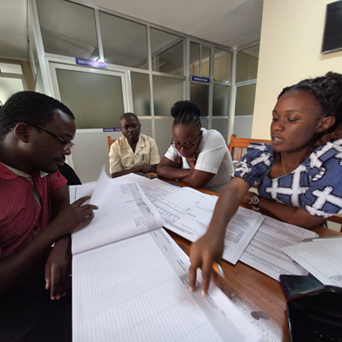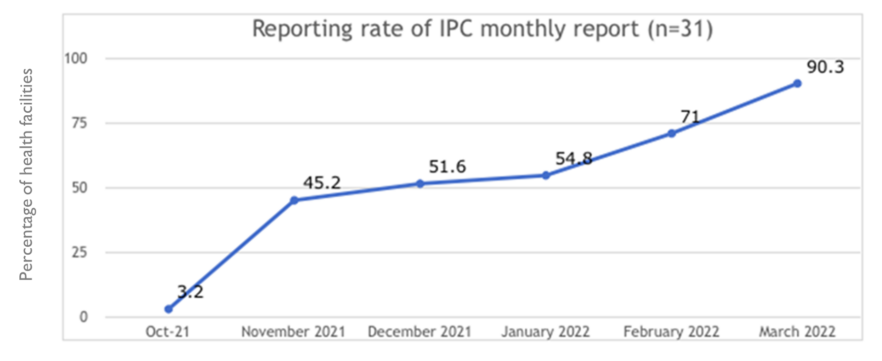Infection Prevention and Control in Tanzania: MTaPS Key in Developing Successful M&E System

Onsite mentoring session. Photo Credit: Doris Lutkam/MTaPS Tanzania
In Tanzania, the absence of a reliable monitoring and evaluation (M&E) system threatened efforts by health facilities to implement guidelines for preventing and stopping the spread of infection.
USAID’s Medicines, Technologies, and Pharmaceutical Services (MTaPS) Program supported the Tanzania Ministry of Health (MOH) in developing a system to gather the data needed to make informed decisions with respect to Infection Prevention and Control (IPC) continuous quality improvement. IPC data is now available from the national to the subnational levels following the integration of the M&E system with Tanzania’s required national health-related reporting system, District Health Information Software 2 (DHIS2), thereby ensuring sustainability and opportunities for scale-up.
A Strategic Move for Tanzania
IPC reporting is crucial for the MOH to plan supervision and mentorship activities and to promote ongoing improvements in IPC nationally. The COVID-19 pandemic had slowed implementation of IPC activities, and, from a strategic perspective, the lack of an integrated M&E system prevented health facilities in Tanzania from meeting reporting mandates, sharing best practices, and scaling up IPC efforts.
A Plan for Success
MTaPS coordinated with various Government of Tanzania ministries; local government bodies; the President’s Office, Regional Administration, and Local Government Tanzania; the World Health Organization; Medipeace; and the University of Dar es Salaam to ensure success, developing an M&E system and supporting the dissemination of information and the promotion of data use.
Key contributions include:
- Coordinating and participating in stakeholder meetings to develop the national IPC M&E framework
- Supporting the national IPC technical working group to develop tools for reporting IPC data from the health facility level to the national level
- Developing an IPC dashboard within the DHIS2
- Coordinating a stakeholder meeting to analyze datasets and indicators in the DHIS2 to inform progress and identify gaps in implementation
- Developing IPC M&E training materials and training 75 health care workers on the collection, reporting, and use of data in the IPC M&E system
- Offering continuous mentorship with respect to compiling and reporting IPC data into the DHIS2
Promising Results
The success of this initiative led to notable achievements, including the establishment of the first national IPC M&E framework in Tanzania and the ability to leverage DHIS2 for integrating the IPC reporting system into the national system. As a result, 31 facilities now report monthly and quarterly on IPC.

As the country scales up the effort, the M&E system will equip the MOH with necessary data, allowing for timely feedback. Training prepares health care workers for improved and consistent reporting, and new capacities for peer learning allow for the exchange of information and best practices—which is crucial for sustaining improvements in IPC and staying updated with global practices.
An Eye to the Future
To ensure sustainability, health facilities in Tanzania will need to take actions such as including IPC-related M&E activities into budgets and comprehensive health plans. Other sustainability measures should involve scaling to include additional health facilities and planning targeted mentorship to support continuous improvement efforts.
“The IPC M&E system has great benefits. It helps to push the health facilities to continue implementing IPC even without the MOH going to the health facilities physically. Efforts are being made to scale up the system to all health facilities.”
—Dr. Joseph Hokororo, National IPC Coordinator